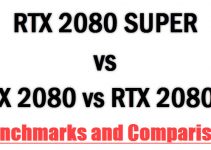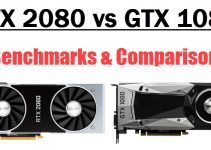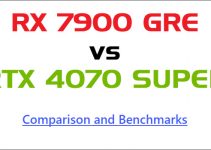Nvidia has finally launched GeForce RTX 5050, the first budget graphics card in the GeForce RTX 50 series. RTX 5050 sits below the RTX 5060 in the RTX 50 series lineup and is targeted for mainstream 1080p gaming. The main competitors of the RTX 5050 are the RTX 4060 and the Radeon RX 7600 from AMD. All three cards are priced very close to each other, and their performance is also quite comparable. RTX 5050, being a newer card, leads in terms of the latest features over the two. Choosing between these budget cards can be a little confusing for some users. To help you select the best budget card for your PC, I have compared them on various important parameters below.
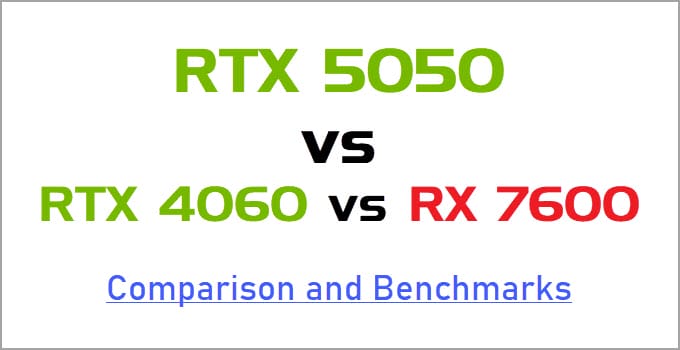
RTX 5050 vs RTX 4060 vs RX 7600 Comparison
A quick comparison between RTX 5050, RTX 4060, and RX 7600 graphics cards based on their specifications, gaming performance, pricing, power consumption, and features.
GPU Architecture
GeForce RTX 5050 is built on Nvidia’s Blackwell GPU architecture on a 5nm manufacturing process. It uses GB207 GPU chip and has 2560 CUDA Cores, 20 RT Cores (4th Generation), and 80 Tensor Cores (5th Generation). The GeForce RTX 4060 is based on the older Ada Lovelace GPU architecture and is manufactured using a 5nm process. It uses the AD107 GPU Chip and comes with 3072 CUDA Cores, 24 RT Cores, and 96 Tensor Cores. On the other hand, the AMD Radeon RX 7600 is built on the RDNA 3 GPU architecture, utilizing a 6nm fabrication process and featuring a Navi 33 GPU chip. It has 2048 Stream Processors, 32 Ray Accelerators, and 64 AI Accelerators.
Must Read: CUDA Cores vs Stream Processors
| RTX 5050 | RTX 4060 | RX 7600 | |
| GPU Chip | GB207 | AD107 | Navi 33 |
| GPU Architecture | Blackwell | Ada Lovelace | RDNA 3 |
| Fabrication Process | 5nm | 5nm | 6nm |
| CUDA Cores/Stream Processors | 2560 CUDA Cores | 3072 CUDA Cores | 2048 Stream Processors |
| RT Cores | 20 (4th Generation) | 24 (3rd Generation) | 32 Ray Accelerators |
| Tensor Cores / | 80 (5th Generation) | 96 (4th Generation) | 64 AI Accelerators |
Video RAM [VRAM]
All three graphics cards come with 8GB GDDR6 memory, having a 128-bit interface. The only difference is the speed of video memory and the bandwidth generated. The memory speed of the RTX 5050 is 20 Gbps, and the bandwidth generated is 320 GB/s. In comparison, the memory speed of the RTX 4060 is 17 Gbps, with a memory bandwidth of 272 GB/s. On the other hand, the memory of the RX 7600 runs at 18 Gbps and generates a bandwidth of around 288 GB/s. The RX 7600 also comes equipped with 32MB Infinity Cache, an ultra-fast cache designed to achieve significantly higher peak memory bandwidth for a short period.
| RTX 5050 | RTX 4060 | RX 7600 | |
| Memory Size | 8GB GDDR6 | 8GB GDDR6 | 8GB GDDR6 |
| Memory Interface | 128-bit | 128-bit | 128-bit |
| Memory Speed | 20 Gbps | 17 Gbps | 18 Gbps |
| Memory Bandwidth | 320 GB/s | 272 GB/s | 288 GB/s |
| Infinity Cache | NA | NA | 32 MB |
Features
All three graphics cards support DirectX 12, OpenGL 4.6, Vulkan, AV1 Encode/Decode, Real-Time Ray Tracing, and variable refresh rate technologies, including G-Sync and FreeSync. RTX 5050 supports PCIe 5.0 (x8) while RTX 4060 Ti and RX 7600 support PCIe 4.0 (x8) interface. Regarding image upscaling technologies to increase frame rates in games, the RTX 5050 supports DLSS 4, the RTX 4060 supports DLSS 3, while the RX 7600 supports AMD FidelityFX Super Resolution (FSR 3).
Regarding video output ports, the RTX 5050 supports DisplayPort 2.1b and HDMI 2.1b, while the RX 7600 supports DisplayPort 2.1a and HDMI 2.1a. In contrast, the RTX 4060 Ti supports HDMI 2.1a but does not support DisplayPort 2.1; instead, it supports DisplayPort 1.4a only.
| RTX 5050 | RTX 4060 | RX 7600 | |
| Bus Interface | PCIe 5.0 x8 | PCIe 4.0 x8 | PCIe 4.0 x8 |
| DirectX | 12 Ultimate | 12 Ultimate | 12 Ultimate |
| OpenGL | 4.6 | 4.6 | 4.6 |
| Vulkan | 1.4 | 1.3 | 1.3 |
| SLI / CrossFire | No | No | No |
| VR Ready | Yes | Yes | Yes |
| G-Sync/FreeSync | Yes | Yes | Yes |
| HDMI 2.1 | Yes | Yes | Yes |
| DisplayPort 2.1 | Yes | No | Yes |
| AV1 Support (Encode/Decode) | Yes | Yes | Yes |
| Real-Time Ray Tracing | Yes | Yes | Yes |
| Deep Learning Super Sampling (DLSS) | DLSS 4 | DLSS 3 | No |
| FidelityFX Super Resolution (FSR) | NA | NA | FidelityFX Super Resolution (FSR 3) |
Gaming Performance
Here are the gaming benchmarks of these cards at 1080p resolution in the latest AAA games.
1080p Gaming Benchmarks
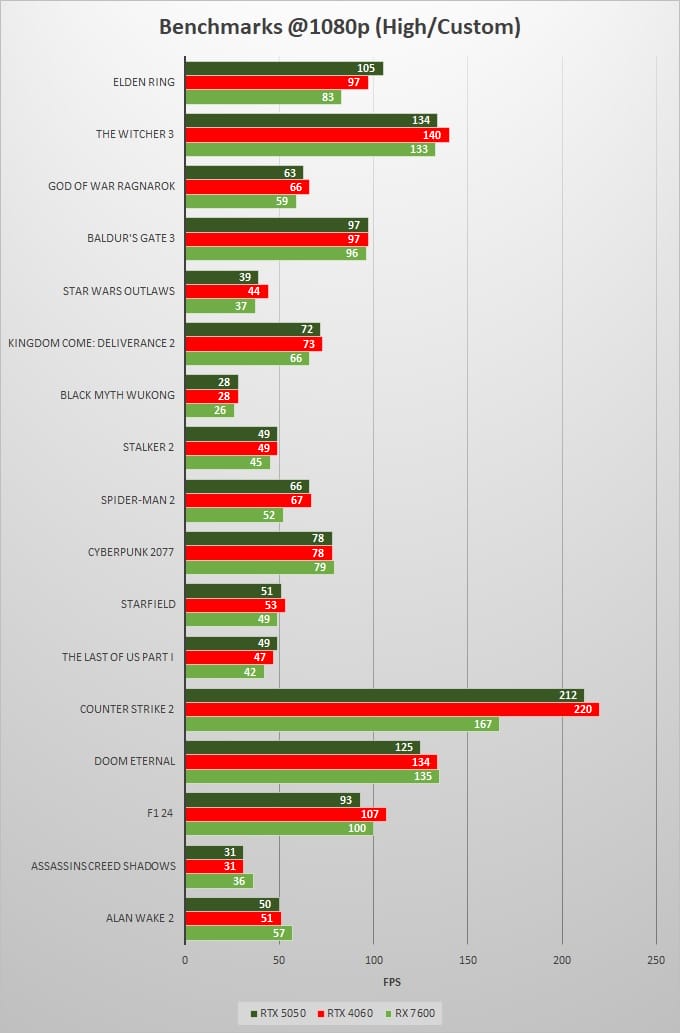
From the above benchmarks, we can see that the gaming performance of all three cards is nearly identical. On average, RTX 5050 is 3 percent faster than RX 7600, while RTX 4060 is 3 percent faster than RTX 5050.
Power Consumption
RTX 4060 has the lowest power consumption at 115W, while RX 7600 has the highest at 165W. The power consumption of the RTX 5050 is slightly higher than that of the RTX 4060, at 130W.
| RTX 5050 | RTX 4060 | RX 7600 | |
| Power Connector | 8-pin PCIe | 8-pin PCIe | 8-pin PCIe |
| Power Consumption | 130W | 115W | 165W |
| Recommended PSU | 550W | 550W | 550W |
Pricing & Availability
RTX 5050 has the lowest MSRP of 249 USD. For the RTX 4060, it is USD 299, and for the RX 7600, it is USD 269. The custom models of these cards from various AIBs may cost more. You can check the latest prices of these cards using the links below.
Check RTX 5050 Price on Amazon
Check RTX 4060 Price on Amazon
RTX 5050 vs RTX 4060 vs RX 7600 Specifications
| RTX 5050 | RTX 4060 | RX 7600 | |
| GPU Chip | GB207 | AD107 | Navi 33 |
| GPU Architecture | Blackwell | Ada Lovelace | RDNA 3 |
| Fabrication Process | 5nm | 5nm | 6nm |
| CUDA Cores/Stream Processors | 2560 CUDA Cores | 3072 CUDA Cores | 2048 Stream Processors |
| Ray Tracing Cores | 20 (4th Generation) | 24 (3rd Generation) | 32 Ray Accelerators |
| Tensor Cores | 80 (5th Generation) | 96 (4th Generation) | 64 AI Accelerators |
| Memory Size | 8GB GDDR6 | 8GB GDDR6 | 8GB GDDR6 |
| Memory Interface | 128-bit | 128-bit | 128-bit |
| Memory Speed | 20 Gbps | 17 Gbps | 18 Gbps |
| Memory Bandwidth | 320 GB/s | 272 GB/s | 288 GB/s |
| Bus Interface | PCIe 5.0 x8 | PCIe 4.0 x8 | PCIe 4.0 |
| DirectX | 12 Ultimate | 12 Ultimate | 12 Ultimate |
| OpenGL | 4.6 | 4.6 | 4.6 |
| Vulkan | 1.4 | 1.3 | 1.3 |
| SLI / CrossFire | No | No | No |
| VR Ready | Yes | Yes | Yes |
| G-Sync/FreeSync | Yes | Yes | Yes |
| Power Consumption | 130W | 115W | 165W |
| Recommended PSU | 550W | 550W | 550W |
Final Words
RTX 5050 is a good card for 1080p and eSports gaming. The card is also priced reasonably well, considering the current PC market. While the performance of the RTX 5050 is similar to that of the RTX 4060 and RX 7600, the RTX 5050 has the advantage of DLSS 4 Frame Generation, which can be particularly beneficial in the latest AAA games for enhancing performance. Additionally, it features newer and more advanced video encoders for hardware acceleration, surpassing its competitors. If you have any questions or would like to share your thoughts on the subject, please feel free to comment below.
(*This post may contain affiliate links, which means I may receive a small commission if you choose to purchase through the links I provide (at no extra cost to you). Thank you for supporting the work I put into this site!)
